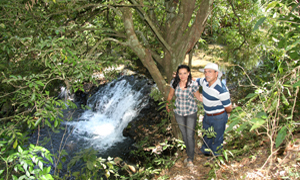Rising to the sustainable quality challenge

Isabel María Chávez Quesada and her husband Freddy Jinesta Valverde initially dismissed the idea of participating in the Nespresso AAA Sustainable Quality™ Program. “At first we thought that it was aimed at larger farms that can make bigger investments because of their higher output. We thought it would be too difficult to meet all of the program’s requirements, and also too costly,” said Isabel María. But when a representative from the coffee supplier Volcafe invited them to an information session about the program, they decided to learn more.
It was the combination of environmental and social aspects covered by the AAA Program that convinced the couple to join in 2007. “We wanted to farm in as environmentally friendly a way as possible, without harming the natural world. The health aspect was very important to us, as we felt we had been using a lot of agrochemicals. We were also very attracted to the social side, since it is our family’s principle to always try to act fairly and care about people, especially the harvesters, since these people are in need of the greatest help,” Isabel María explained.
“When we saw that the agronomists in the AAA Program were willing to help us develop in these areas, little by little, we accepted the challenge. So far we have had good results.”
Upholding biodiversity through coffee farming
At 51, Isabel María has been running her family’s farm for the last 10 years. Her husband Freddy, seven years her senior and a retired university administrator, does most of the work on the farm. Isabel Maria helps out occasionally, along with temporary workers who assist with the harvest.
